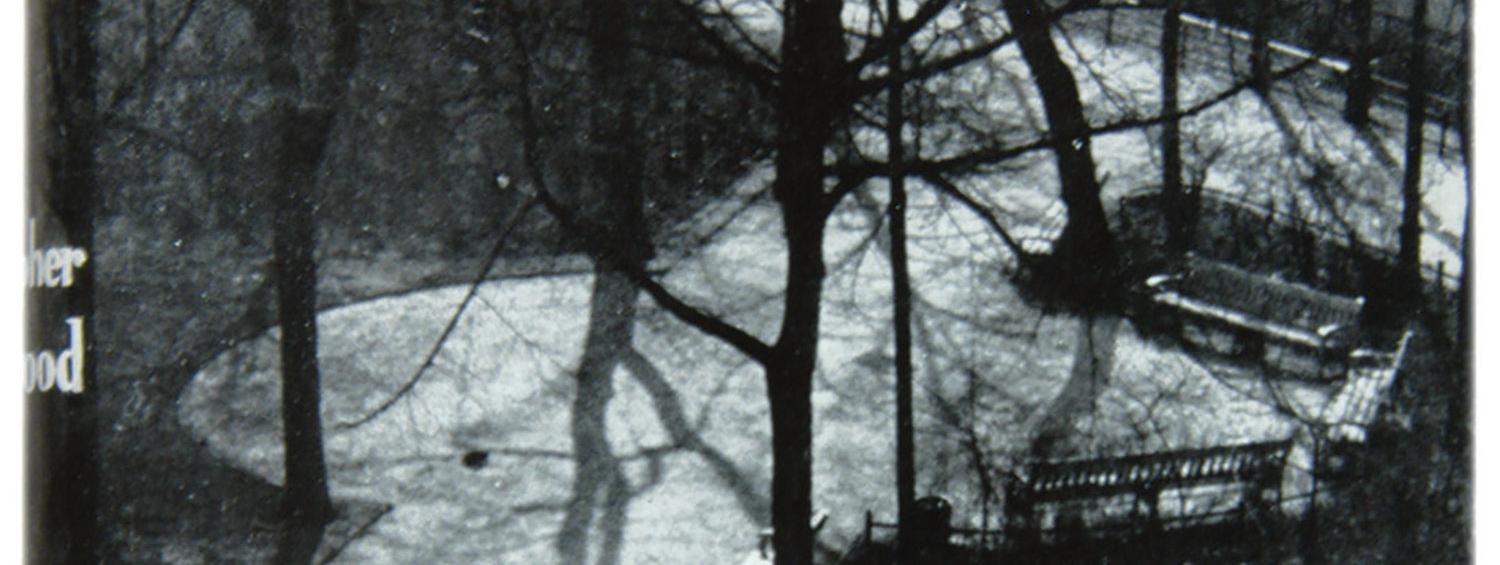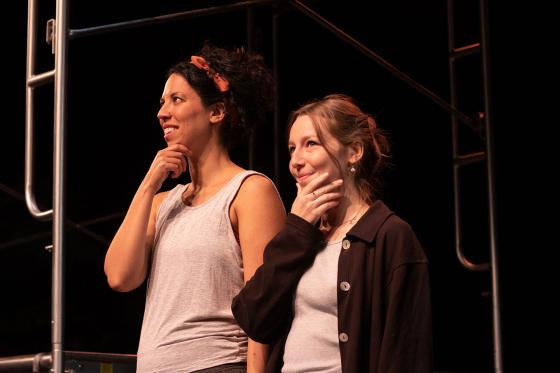Last week, we began rehearsals for Cabaret, the first production of Olney’s 82nd season! In anticipation of our next Mainstage musical, we thought we’d offer you some background on how the story of Cabaret came to be.
Cabaret is a 1966 musical with a book by Joe Masteroff, music composed by John Kander and lyrics by Fred Ebb. The story is based on John Van Druten’s 1951 play I Am a Camera, which itself was adapted from Christopher Isherwood’s novel Goodbye to Berlin.
Goodbye to Berlin was published in 1945 by Christopher Isherwood. The protagonist is a semi-autobiographical figure, Christopher Isherwood or “Chris,” who is a British writer and a self proclaimed unbiased observer, passively noting the extraordinary people and events happening around him. The opening line of the novel reads, “I am a camera with its shutter open, quite passive, recording, not thinking… Some day, all of this will have to be developed, carefully printed, fixed.” Although the central character shares his name, Isherwood made it clear that the book was not intended to be wholly autobiographical.
Isherwood describes Berlin as “a city of self-indulgent pleasure where anyone rich enough can satisfy his most extravagant sexual needs, where dancing between men is permitted and where the bars never close.” The novel is episodic and consists of six short stories, or chapters, strung together to paint a picture of Berlin at the dawn of Hitler’s rise to power. In the first chapter, A Berlin Diary (Autumn 1930), Isherwood is introduced to Fraulein Schroeder, a German woman who runs the boarding house where Isherwood stays, and Fraulein Kost, one of her tenants who supports herself by prostitution. The second chapter, Sally Bowles, is mainly about the iconic character at the heart of I Am a Camera and Cabaret. Her role in Goodbye to Berlin, though significant, is not as central as it is in the play and musical adaptations. Isherwood describes Sally, saying, “she sang badly, without expression, her hands hanging down at her sides--yet her performance was, in its own way, effective because of her startling appearance and her air of not caring a curse what other people thought of her.” The two form a deeply passionate relationship and even live together for a time, but the relationship remains platonic and the two are never sexual. Though Isherwood’s sexuality isn’t explicitly addressed at this point, the question of it is certainly present. Sally becomes pregnant after an affair and Isherwood and Sally mutually agree to an abortion.
In the final chapter, A Berlin Diary (Winter 1932-33), Isherwood is approached by an American boy at a nightclub and asked if he is queer. He responds that he is “very queer indeed,” though some readers have questioned the sincerity of this response. The final chapter documents the rapid and violent political changes at the hands of the Nazis. He describes public beatings and the humiliation of individuals who will not swear allegiance to the Nazi party.
__
I Am a Camera (written by John Van Druten and adapted from Christopher Isherwood’s works, including Goodbye to Berlin) was published and opened on Broadway in 1951. The title of the play is taken from the novel’s opening line. Compared with the novel, the play is more about relationships during a time of strife, and less focused on the ugly political realities of the time.
In the play, Fraulein Schroeder becomes Fraulein Schneider, but her personality remains mostly the same. However, toward the end of the play, Chris terminates their friendship due to her anti-Semitism. In the book and play, Schroeder/Schneider does not have a love affair with a Jewish man, as she does in Cabaret. Instead, a different character, Fritz Wendel, a German man and friend of Chris, falls deeply in love with a Jewish woman, Natalia Landauer. The relationship struggles to survive at first, but then Fritz admits to his own Jewish ancestry and the two become married.
Sally is again a character -- more central to the story this time -- but not much character development is added. Chris speculates, "I wonder how old she is? Her face is young, but her hands look terribly old. And they were dirty, too. Dirty as a little girl's hands. Sally's hands were like the old hands of a dirty little girl." Sally again becomes pregnant after an affair. In this story, she convinces Chris to fake a proposal in order to appease her mother (a new character). The two eventually part ways, with Chris returning to England to pursue his writing career, and Sally going to the Riviera to pursue her film career.
___
Cabaret (music by John Kander, lyrics by Fred Ebb, book by Joe Masteroff) opened on Broadway on November 20, 1966 at the Broadhurst Theatre and ran on three Broadway stages for over 1000 performances before closing on September 6, 1969. The original production was directed by Harold Prince, who was chiefly interested in how the counterculture movements and anxieties of 1960’s America related to pre-Nazi Berlin. At his first rehearsal, he showed a photograph of an angry white man taunting an off-camera crowd. The cast assumed it was a photograph of a Nazi soldier taunting a crowd of Jewish people, but it was actually a photograph from that year (1965) of a white man harassing a group of Black tenants in Chicago.
One of the biggest shifts from the play was the decision to make the nightclub, the Kit Kat Klub, a central location of the musical (it was previously only mentioned in relation to Sally). In the musical, the protagonist’s name is changed from Chistopher Isherwood to Clifford Bradshaw (Bradshaw is a name that comes from Mr. Norris, another one of Isherwood’s works). The character is now an American writer, rather than a British one. And his relationship with Sally is now unambiguously sexual. . In the original Cabaret, Cliff is a straight man (at least, there are no suggestions otherwise in the text) and there is no question that Cliff is the one who impregnates Sally. Later revivals, including Prince’s 1987 revival and the 1993 Sam Mendes revival (the version OTC is producing), have portrayed Cliff as a bisexual man or closeted gay man, honoring the original content of Goodbye to Berlin.






